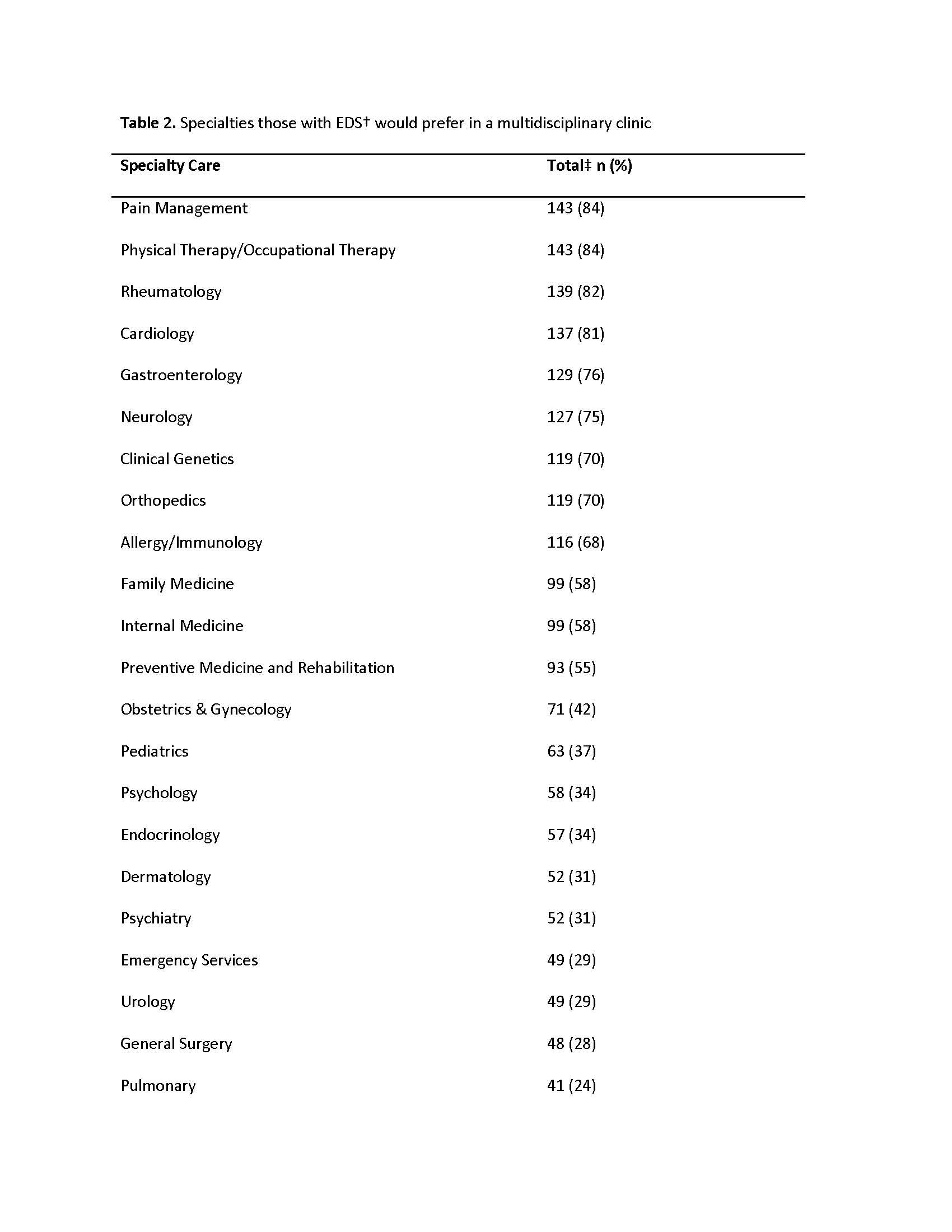Session Information
Session Type: Poster Session A
Session Time: 1:00PM-3:00PM
Background/Purpose: Ehlers-Danlos Syndrome (EDS) represents a family of heritable connective tissue disorders with overlapping phenotypic features, frequently including joint hypermobility, tissue fragility, and skin hyperextensibility, and comorbid symptoms are common for patients with EDS and include multiple body systems. To address the many comorbidities and high disease burden in those with EDS, multidisciplinary care has been proposed to help facilitate coordination of care, maximize treatment, and reduce medical visits. While multidisciplinary care is needed for patients with EDS, it is unclear which specialties patients with EDS feel they need as part of a multidisciplinary care model to address their needs. The objective of this study was to determine interest and identify specific needs for multidisciplinary care for patients with EDS.
Methods: An electronic survey was sent via an anonymous link to adults with an EDS diagnosis and parents of minors with an EDS diagnosis over a three-month period. Participants were solicited through EDS support groups within 200 miles of a Mid-Western metropolitan area. Participants were asked to respond according to their personal experience. The survey contained questions pertaining to patient-reported EDS subtype, number of minors with EDS in the household, medical care needs, interest in multidisciplinary health care for EDS, and how far respondents would be willing to travel to obtain multidisciplinary care for themselves.
Results: Of 206 adult respondents that reported information about themselves they also reported information about 162 minors for a total of 368 subjects. The most common diagnosis was hEDS for adults (63%) and minors (62%) and was most diagnosed by geneticist (46%) and rheumatologist (23%) (Table 1). There was a minimum of 693 unique visits across 27 different specialties at over 20 different hospitals or clinics in the surveyed area, and most (67%) report their current EDS medical care needs are not being met, while 87% responded that it would be beneficial to receive care from a multidisciplinary clinic for EDS. Respondents reported interest in pain management (84%), physical and occupational therapy (84%), rheumatology (82%), and cardiology (81%) as part of a hypothetical multidisciplinary clinic for EDS (Table 2). Additionally, respondents report willingness to travel to obtain care at an EDS multidisciplinary clinic with 22% willing to travel 60-120 minutes, 22% willing to travel more than 120 minutes and 15% willing to fly to obtain care.
Conclusion: Findings from this study suggest that there are several specialties that diagnose patients with EDS including rheumatology. Many respondents obtain care from several subspecialties, which may lead to fractured, poorly coordinated care that does not meet the patient’s needs and leads to lack of trust in healthcare providers and negative expectations for healthcare needs. Patients with EDS are interested in multidisciplinary care with a musculoskeletal focus and are willing to travel to obtain care. This represents a unique opportunity to bolster rheumatology involvement in specialized multidisciplinary care for patients with EDS, that can address their specific needs and provide coordinated care.
To cite this abstract in AMA style:
Jones J, Black W, Cogan W, Callen E. A Survey of Patients with Ehlers Danlos Syndrome and Their Interest in Multidisciplinary Care [abstract]. Arthritis Rheumatol. 2022; 74 (suppl 9). https://acrabstracts.org/abstract/a-survey-of-patients-with-ehlers-danlos-syndrome-and-their-interest-in-multidisciplinary-care/. Accessed .« Back to ACR Convergence 2022
ACR Meeting Abstracts - https://acrabstracts.org/abstract/a-survey-of-patients-with-ehlers-danlos-syndrome-and-their-interest-in-multidisciplinary-care/



